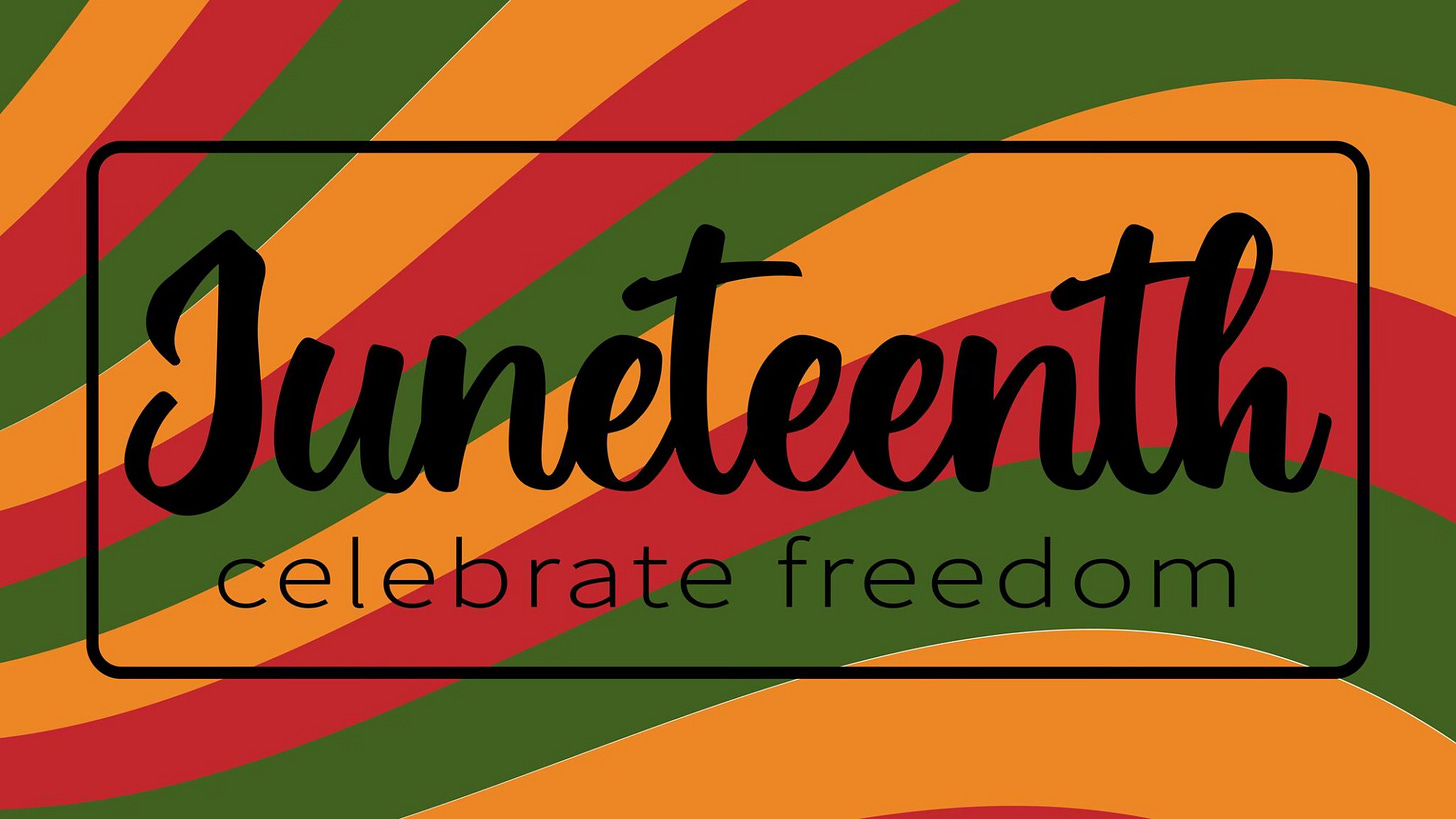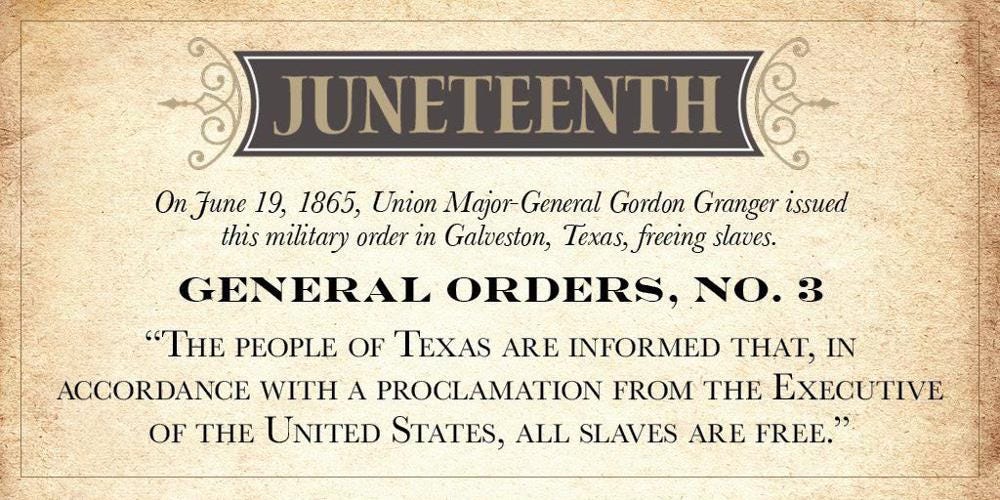How Juneteenth Redefines Freedom
As we celebrate Juneteenth, we must understand that the emancipation of Black Americans ushered in a new understanding of freedom that radically reconstructed the United States for the better and warrants national recognition on par with, if not above, the Fourth of July.
Juneteenth and Reconstruction commenced a transformational discussion regarding freedom that I define as a shift from understanding freedom as a freedom from to a freedom with.
On the Fourth of July, we celebrate the ratification of the Declaration of Independence in 1776 in which the Thirteen Colonies formally declared their independence from the British. For the previous decade, following Britain’s victory over the French in 1763 in the French and Indian War, the American colonies and the British government clashed over taxation and other enforcement measures imposed by the British upon the colonies. The British needed to pay for various war-related expenses and they wanted to generate these funds by taxing the colonies.
The Stamp Act in 1765 and the Townshend Act in 1767 were two of the more egregious taxations, and the fact that the colonists did not have any representation in Britain’s Parliament only heightened their fury. They claimed that these taxes were unconstitutional and the slogan “No Taxation Without Representation” became a colonial rallying cry. Tensions continued to rise between the colonists and the British and about a decade later, in 1775, the American Revolutionary War commenced. In a little less than a decade of fighting, the American colonies won their freedom from the British in 1783.
This struggle for freedom from taxation and freedom from the British lasted two decades, and freedom from became the basis of American freedom. The American colonists now had the opportunity to create a government without the British. Their iteration of freedom was a freedom from their oppressors, and now they were free to behave however they chose. They were even free to become oppressors. America’s freedom from is baked into the U.S. Constitution, and I think the Second Amendment is one example of the inadequacy of freedom from and how it can destroy freedom and promote tyranny.
The language of the Second Amendment states that “A well regulated Militia, being necessary to the security of a free State, the right of the people to keep and bear Arms, shall not be infringed,” and it is generally understood that this language existed to ensure that America’s freedom from the British remained. Americans needed guns so that they could fight against British tyranny, but they also needed guns so that they could inflict tyranny upon indigenous people and enslaved Africans.
Following the French and Indian War, King George III issued the Royal Proclamation of 1763 that prevented colonists from invading indigenous lands west of the Appalachian Mountains. Not being able to seize indigenous lands was another source of tension, but the defeat of the British and the creation of the Second Amendment allowed for the unfettered invasion of indigenous lands. Similarly, the American slave trade required that white Americans remain armed so that they could oppress the enslaved and combat slave rebellions. Countless slave rebellions were defeated by well regulated white militias.
America’s freedom from primarily existed as a response to oppression, but its main priority is not the expansion of freedom. It is a freedom that allegedly derives from the absence of tyranny while also allowing the “free” to engage in tyranny. A freedom from does not educate people about how they can best use their freedom, and this allows for an interpretation of freedom that is far too individualistic, dishonest, and allows for the denial of freedom to also be an expression of freedom.
At first glance, Juneteenth appears to also be a freedom from because it was a freedom from slavery, but unlike the colonists and the British, the newly-freed Black Americans could not build a society and government apart from their white oppressors. Freedom from slavery occurred, but now they had to create a freedom with, or a freedom within, the United States that included their former oppressors.
To this day, the United States still struggles to understand and implement freedom with, and this struggle is evident in General Order No. 3, issued on June 19, 1865, that freed enslaved people in Texas and marked the beginning of Juneteenth.
General Order No. 3 is only four sentences:
“The people of Texas are informed that, in accordance with a proclamation from the Executive of the United States, all slaves are free. This involves an absolute equality of personal rights and rights of property between former masters and slaves, and the connection heretofore existing between them becomes that between employer and hired labor. The freedmen are advised to remain quietly at their present homes and work for wages. They are informed that they will not be allowed to collect at military posts and that they will not be supported in idleness either there or elsewhere.”
The first sentence stipulates the freedom from and the rest of the order pertains to problematic attempts at cultivating freedom with. Black freedom was now supposed to exist with white freedom, yet America struggled to imagine how this iteration of freedom could even exist. In 1865, they imagined freedom with to equate to essentially maintaining America’s status quo, but adding a monetary exchange between the newly freed and their former enslavers.
Today, we all know that it was absurd to expect white Texans in the 1860s to treat freed Black Americans with respect and cultivate an equitable relationship of employer and employee, but at the time, this constituted a radical idea. Likewise the last sentence and the reference to “idleness” speak to the racist stereotypes that undermined any attempts at white Americans freely living with Black Americans.
Reconstruction, which lasted from the end of the Civil War in 1865 until 1877, was America’s first attempt at creating a democracy centered around a freedom with and Reconstruction’s collapse was due to this nation’s embrace of a freedom from. Juneteenth was part of Reconstruction.
Reconstruction acknowledged that granting Black Americans their freedom from enslavement was not enough because white Americans would simply conjure up ways to place Black Americans into de facto enslavement. Also, freedom had to come with the ability to freely exercise the rights and privileges that come with freedom. The shift from freedom from to freedom with meant that bold questions needed to be asked and answered about the meaning of freedom.
Does freedom also come with citizenship? Does citizenship also come with voting rights? Should white Americans get punished for denying Black Americans the ability to exercise their freedoms? The Fourteenth and Fifteenth Amendments, the creation of multiple civil rights acts, and the creation of the Department of Justice during Reconstruction answered these questions. They enhanced and protected Black freedoms, and aspired to ensure that Black freedom and our ability to be free with each other would not be destroyed by the tyranny of being free from each other.
However, the white supremacists who wanted to destroy Reconstruction believed that white freedom had to be a freedom from Black freedom. Their freedom could only exist in the absence of another’s freedom. These white Americans used the freedoms of the Second Amendment to create white militias such as the Ku Klux Klan to terrorize Black Americans and their white allies. Their violence aspired to reclaim political control of the South and end Reconstruction. When they succeeded via their terrorism and tyranny that they called freedom, they advocated for America’s freedom from and demonized our freedom with.
Separate but equal and Plessy v. Ferguson are other iterations of freedom from, and they created Jim Crow, segregation, and an American apartheid that lasted for more than half a century. To this day, civil rights advocates are still working to undo the damage of America’s freedom from and cultivate an equitable America with a philosophy of freedom with.
For a society to be truly free, it must liberate itself from its oppressors—the freedom from—and cultivate an understanding that freedom is something that we do with other people—the freedom with. If a society primarily knows the freedom from, then its understanding of freedom will remain immature and underdeveloped, and can easily devolve into the tyranny it hoped to escape from.
Juneteenth and Reconstruction commenced a new philosophy of freedom that needs to be celebrated and not violently suppressed or ignored. Juneteenth marks an American independence that is just as, if not more, important than America’s independence from the British.


